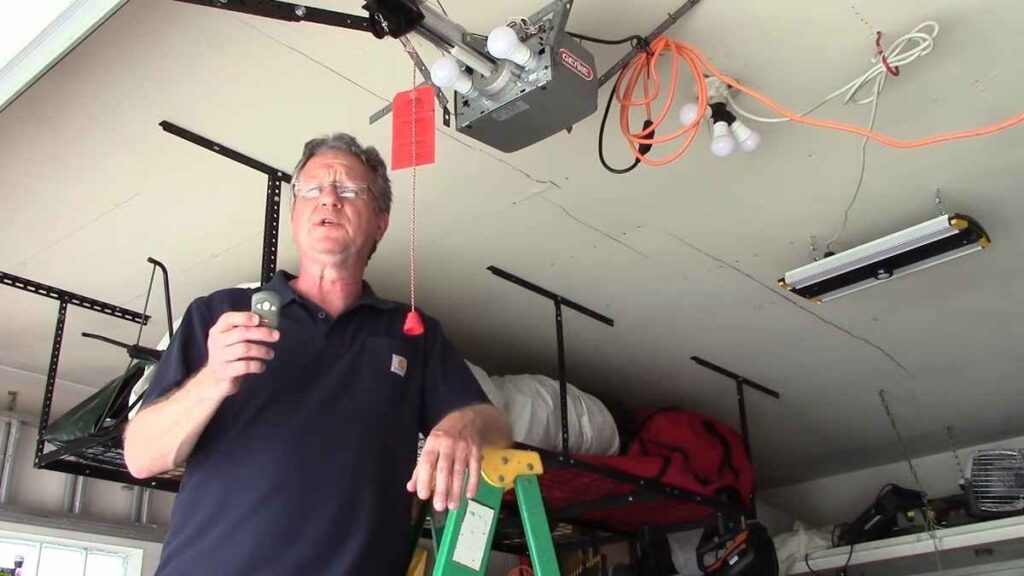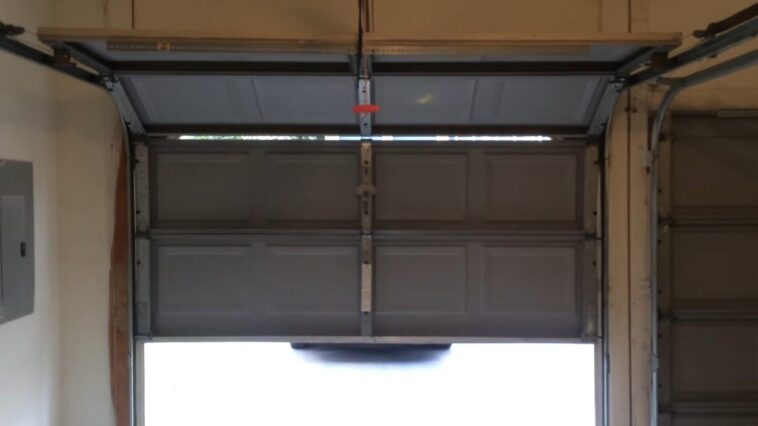Affiliate Disclosure: We may earn money or products from the companies mentioned in this post.
I’ve been there – you hit the button to open your garage door, and instead of a smooth and quiet operation, you’re met with an unsettling jerk and shudder.
It’s not only frustrating but can also be a cause for concern. If your garage door is jerking when opening and closing, you’re not alone.
But it’s not just about fixing the issue – safety is paramount. A jerking garage door can pose risks to your family and property. So, throughout this post, I’ll also highlight the importance of safety measures and precautions to ensure that you tackle the problem responsibly.
Understanding the Causes
1. Misaligned Tracks
One of the most frequent reasons for a jerking garage door is misaligned tracks. Over time, the tracks that guide your door’s movement can become slightly out of place.
This misalignment can cause the rollers to catch or jump on the tracks, resulting in a jerky motion.
2. Damaged Rollers
Worn-out or damaged rollers are another potential cause. Rollers are essential for the smooth movement of the garage door, and when they’re not functioning correctly, the door can exhibit jerky behaviour.
You might hear unusual noises, like grinding or squeaking, when rollers are the issue.
3. Worn-Out Springs
The springs of your garage door play a crucial role in its operation. When the springs become worn out or break, they can lead to an uneven and jerky movement.
This problem can be particularly dangerous, as it affects the door’s balance.
4. Loose Hardware
Over time, the constant movement of your garage door can cause nuts, bolts, and other hardware to loosen.
Loose components can result in an unstable door and lead to jerking as it moves along the tracks.
5. Lubrication Issues
Proper lubrication is essential for the smooth functioning of your garage door. If the moving parts are not adequately lubricated, friction can cause jerky movements.
This is a relatively simple issue to address and can often be part of routine maintenance.
Safety Concerns
1. The Risks Involved
First and foremost, you need to be aware of the risks associated with a jerking garage door. A door that doesn’t move smoothly can suddenly drop, become stuck, or exhibit erratic behaviour.
This poses a real danger, especially if there are people or valuable items in the vicinity. It’s not just an inconvenience; it’s a safety hazard.
2. Protecting Your Family and Property
Your family’s safety should always be a top priority. If your garage door jerks, it’s essential to keep children and pets away from the area until the problem is resolved.
Teach them about the potential dangers and ensure they understand the need for caution.
Likewise, valuable items stored in your garage, such as your car or tools, could be at risk if the door suddenly fails. Taking safety precautions can help prevent accidents and damage.
3. Do Not Ignore the Problem
Sometimes, in our busy lives, it’s tempting to ignore minor issues like a jerking garage door, hoping they’ll go away on their own.
However, this is a mistake when it comes to safety concerns. Ignoring the problem can lead to further damage, making the situation even more hazardous.
4. Immediate Action
If you notice your garage door jerking or behaving erratically, take immediate action. Discontinue the use of the door until the issue is resolved.
This might mean manually operating the door if necessary and safe to do so.
5. Professional Assistance
For safety’s sake, it’s often best to seek professional assistance when dealing with a malfunctioning garage door.
A trained technician can diagnose the problem, make necessary repairs, and ensure that the door operates safely.
DIY Fixes

While some problems may require professional assistance, several DIY fixes can help alleviate the issue and save you money.
Here are some steps and tips I’ve found helpful:
1. Visual Inspection
Start by visually inspecting your garage door system. Look for any obvious issues like loose hardware, dents, or visible damage.
2. Lubrication
One common cause of jerking garage doors is inadequate lubrication. I recommend using a high-quality silicone-based garage door lubricant on the rollers, tracks, hinges, and springs. This can often smooth out the operation.
3. Tighten Loose Hardware
Over time, vibrations can cause nuts and bolts to come loose. Grab a wrench and tighten any loose hardware you find, but be careful not to overtighten, as it can cause other problems.
4. Track Alignment
Misaligned tracks can lead to jerky door movement.
Check the tracks for alignment and use a rubber mallet to gently tap them back into place.
This should be done with caution, as improper adjustments can worsen the issue.
5. Spring Adjustment
Garage door springs can lose tension over time. If your door has extension springs, you can adjust their tension.
However, I must emphasize that this task can be dangerous, and if you’re not experienced, it’s best to leave it to professionals.
6. Test and Observe
After performing these DIY fixes, it’s essential to test your garage door’s operation. Open and close it a few times and observe whether the jerking has improved.
If it hasn’t, you may need to consider professional help.
7. Safety First
Throughout the DIY process, remember to prioritize safety. Always disconnect the opener and ensure the door is secure before attempting any repairs.
If you’re unsure or uncomfortable with any of the steps, don’t hesitate to call in a professional.
8. Documentation
Keep a record of your DIY efforts, especially if you’re unable to completely resolve the issue. This documentation can be valuable if you decide to seek professional assistance.
Product Recommendations
Garage Door Lubricant
A high-quality garage door lubricant is essential for ensuring smooth and quiet door operation.
Look for a lubricant specifically designed for garage doors, and regularly apply it to the moving parts like rollers, hinges, and springs. This can help reduce friction and prevent jerking.
Adjustable Wrench
An adjustable wrench is a versatile tool for minor adjustments. Use it to tighten loose bolts and nuts on your garage door’s hardware.
Safety Glasses and Gloves
Safety should be a top priority when working on your garage door. Invest in a pair of safety glasses to protect your eyes from debris and gloves to safeguard your hands.
Rollers and Bearings
If you notice that your garage door rollers or bearings are damaged, consider purchasing replacements. Opt for high-quality nylon or steel rollers for smooth operation.
Replacement Springs
Worn-out or damaged springs are a common cause of jerking garage doors. If you have experience in replacing garage door springs, having replacements on hand is a good idea. However, spring replacement can be dangerous and is often best left to professionals.
Cordless Drill
A cordless drill with the appropriate bits can save you time and effort when working on your garage door. It’s particularly handy for removing and installing hardware.
Garage Door Opener Remote
If your garage door opener remote is old or malfunctioning, consider replacing it. A reliable remote can ensure smoother and more predictable door operation.
Weather Stripping
To keep out drafts and maintain temperature control in your garage, replace or install weather stripping around the door. This can also reduce noise and vibrations during operation.
Garage Door Insulation Kit
If your garage serves as more than just a storage space, insulating your garage door can improve energy efficiency and reduce jerking caused by temperature-related issues.
Wireless Garage Door Monitor
For added convenience and peace of mind, you can install a wireless garage door monitor that allows you to check the status of your garage door remotely using your smartphone.
When to Seek Professional Help
Sometimes, it’s tempting to take a DIY approach to resolve issues with your garage door, especially if you’re handy with tools and enjoy tackling home improvement projects.
But there are situations where seeking professional help is not only wise but also essential to ensure the safety and effectiveness of the repair.
1. Complex Repairs
If the issue involves complex components like the motor, control system, or extensive structural damage, it’s best left to the experts.
Attempting to fix these without the necessary knowledge and tools can lead to further complications and potentially costlier repairs.
2. Spring Replacement
Garage door springs are under immense tension and can be extremely dangerous to work on without the right expertise. If you suspect a problem with your springs, it’s a job for a professional technician who knows how to handle them safely.
3. Electrical Problems: Electrical issues in the garage door opener or control system can be challenging to diagnose and fix for the average homeowner.
Professionals are trained to troubleshoot and repair electrical components, ensuring they operate safely and reliably.
4. Lack of Experience: If you’re not experienced in garage door repair, attempting complicated repairs may lead to mistakes that could pose safety hazards or cause further damage.
Professionals have the knowledge and experience to handle the job correctly.
5. Warranty Concerns
If your garage door is under warranty, attempting DIY repairs might void the warranty. To preserve your warranty and receive any entitled benefits, it’s often necessary to have repairs performed by a certified technician.
6. Safety Concerns
Safety should always be a top priority. If you’re unsure about the safety of a DIY repair or if you’ve encountered unexpected issues during the process, it’s time to call a professional.
They have the tools and training to ensure safety throughout the repair.
7. Time and Convenience
Sometimes, seeking professional help is the most practical choice when you’re short on time or lack the necessary tools.
Professionals can quickly diagnose and fix the problem, saving you the hassle and potential frustration.
Preventive Maintenance
The good news is that many issues leading to jerking can be prevented through regular maintenance practices
Visual Inspections
Regularly examine your garage door for signs of wear and tear. Look for loose hardware, damaged cables, or any misalignment. Identifying problems early can prevent jerking issues from developing.
Lubrication
Proper lubrication is essential for a smooth garage door operation. Use a high-quality garage door lubricant on the rollers, tracks, and hinges. Be sure to follow manufacturer recommendations for the type of lubricant to use.
Tighten Hardware
Over time, nuts and bolts can become loose. Periodically check and tighten all the hardware on your garage door, including brackets and fasteners.
Test the Balance
An unbalanced garage door can lead to jerking when it’s opened or closed. To test the balance, disconnect the opener and manually open the door halfway. If it doesn’t stay in place, it’s likely unbalanced and should be adjusted by a professional.
Clear Tracks
Keep the tracks free of debris, dirt, and any obstructions. Clean the tracks regularly and make sure they’re properly aligned. Misaligned tracks can cause jerking.
Weather Stripping
Inspect the weather stripping along the bottom of the garage door. Replace it if it’s damaged or worn. Good weather stripping helps maintain the door’s seal and smooth operation.
Safety Sensor Check
If your garage door is equipped with safety sensors, ensure they are clean and properly aligned. Misaligned or dirty sensors can cause the door to jerk and may even prevent it from closing.
Regular Professional Maintenance
While there are many tasks you can do yourself, it’s a good idea to schedule annual or bi-annual professional maintenance.
Experienced technicians can identify and address potential issues before they become major problems.


